This gene encodes a member of the sirtuin family of proteins, homologs to the yeast Sir2 protein. Members of the sirtuin family are characterized by a sirtuin core domain and grouped into four classes. The functions of human sirtuins have not yet been determined; however, yeast sirtuin proteins are known to regulate epigenetic gene silencing and suppress recombination of rDNA. Studies suggest that the human sirtuins may function as intracellular regulatory proteins with mono-ADP-ribosyltransferase activity. The protein encoded by this gene is included in class IV of the sirtuin family. [provided by RefSeq, Jul 2008].
- Gene modulation
- RNA interference
- Short hairpin RNA (shRNA)
- SMARTvector Inducible Lentiviral shRNA
SMARTvector Inducible Lentiviral shRNA
The most advanced and flexible single-vector inducible shRNA available for tightly controlled gene silencing

The market standard for inducible RNAi
Combining all of the advantages of the SMARTvector shRNA design innovations with the recently developed Tet-On 3G tetracycline-inducible expression system and the flexibility of SMARTchoice promoter and reporter options, this novel single-vector regulatable RNAi system permits the rapid development of stable cells with tightly controlled shRNA expression.

The minimal leakiness and potent activation of the Tet-On 3G promoter ensures near wild-type expression of the target gene in the absence of doxycycline and robust gene silencing upon exposure to doxycycline. When induced, SMARTvector Inducible Lentiviral shRNA is incredibly potent, resulting in highly efficient knockdown even at very low multiplicities of infection (MOI).
Unsure which format you need? Learn more about our SMARTchoice configuration platform.
Highlights
SMARTvector Inducible Lentiviral shRNA vectors possess the following enhanced features for robust, regulatable, and reproducible shRNA-based gene silencing:
- Target any gene in human, mouse and rat, and tailor experiments to specific cells with multiple promoter options
- Guaranteed silencing (see Guarantee tab)
- Designed using microRNA scaffold-specific attributes for highly efficient processing via the endogenous RNAi pathway
- Tight control of shRNA and reporter gene expression utilizing the latest generation Tet-inducible expression technology, the Tet-On® 3G Inducible System
- Available as glycerol stocks and as high-titer purified, concentrated lentiviral particles at 1 x 107 TU/mL, ± 20%; functional titers determined by flow cytometric analysis of GFP-positive, transduced HEK293T cells
- Suitable for dividing and non-dividing cell types, including difficult-to-transfect cells such as primary, neuronal and stem cells
Together, these attributes greatly enhance the functionality and specificity of lentiviral-mediated RNAi and reduce the toxicity associated with low titer preparations (supernatant).
An optimized inducible gene silencing system in a single vector
The SMARTvector Inducible Lentiviral shRNA vectors incorporate the Tet-On® 3G bipartite induction system, a third-generation Tet-inducible system significantly improved and optimized for minimal basal expression (lowest leakiness) and potent activation upon induction (see References tab). The Tet-On® 3G Inducible System permits tightly controlled shRNA expression and study of gene function in vivo and in vitro with unprecedented precision.
Flexibility to choose your SMARTvector Inducible Lentiviral shRNA vector attributes
Inducible control of the SMARTvector shRNA and the reporter gene are conferred by the Tet 3G promoter (PTRE3G), while the expression of the Tet-On® 3G transactivator protein is under the control of a constitutive RNA pol II promoter. The choice of the constitutive RNA pol II promoter is critical to ensure robust production of PuroR and Tet-On® 3G transactivator protein, thereby allowing antibiotic selection of transduced cells and rigorously controlled expression of the shRNA. Promoter activity varies significantly across different cell lines which, in turn, can influence the efficacy and potency of shRNA-mediated gene silencing. The SMARTchoice inducible vector customization options include four constitutive promoter and two reporter options, thus maximizing the opportunity for RNAi experimental success.
Superior Dharmacon SMARTvector Lentiviral shRNA rational design algorithm for potent knockdown at single-copy integration
- Utilization of a highly processed, patented microRNA scaffold
- Preferential mature strand RISC-loading and activity with minimal processing and activity of passenger (non-guide) strand
- Rationally designed, highly functional gene targeting sequences
- Algorithm trained on more than 500 endogenous mRNA data points for functional knockdown testing
- Incorporation of bioinformatics strategies to reduce off-target gene knockdown events
- Selection of shRNA designs with low microRNA seed-complement frequency
- Additional filtering of shRNA designs for known microRNA and toxicity nucleotide motifs
- Protein coding genes are targeted in the ORF and 3’UTR; lncRNAs are targeted throughout the entire transcript length
Achieve unprecedented levels of sensitivity and gene silencing control for your most sensitive biological applications
The ability to control when and to what degree a gene is silenced has proven invaluable to the task of elucidating gene function in vitro and in vivo, under biologically relevant physiological and disease-associated conditions. Regulatable RNAi systems are particularly useful for functional analysis of genes that, when silenced, may cause deleterious effects or irreversible changes in the cellular state and dynamics. The SMARTvector Inducible Lentiviral shRNA platform facilitates many potential applications, including:
IN VITRO applications such as
- Studying gene function
- Modeling pathways and networks
- Manipulating fate of adult/embryonic cells
- Engineering cell models of disease
- Validating drug targets and mechanism of action (MOA)
EX VIVO applications such as
- Probing tumor phenotypes
- Manipulating fate of adult/embryonic cells
IN VIVO applications such as
- Modeling progressive diseases
- Developing transgenic models
Lentiviral particle formats
At Dharmacon, we are committed to delivering high quality lentiviral particle preparations. As such, we clone, package and concentrate each construct with strict QC controls. Due to the inherent complexity of lentiviral particle production and the quality control procedures, turnaround time is estimated to be 4 to 6 weeks. We offer the following formats:
Set of 3 different gene-targeting constructs
- Ideal for evaluating multiple shRNAs targeting the same gene and ensuring mRNA knockdown in your specific cells
- 100 µL (4 x 25 µL) or 200 µL (8 x 25 µL) total amounts at 1 x 107 TU/mL, ± 20%, functional titers determined by flow cytometric analysis of GFP-positive, transduced HEK293T cells
Individual gene-targeting constructs
- Ideal for ordering one or two constructs that you have identified as being the best performers
- 100 µL (4 x 25 µL) or 200 µL (8 x 25 µL) total amounts at 1 x 107 TU/mL, functional titers determined by flow cytometric analysis of GFP-positive, transduced HEK293T cells
SMARTvector Inducible Lentiviral Positive and Negative Controls for shRNA and microRNA experiments
- Ideal for optimizing transduction and assay conditions prior to gene-specific experimentation
- Negative control particles allow for distinguishing sequence-specific silencing from non-specific effects
- Positive control particles allow for confirmation of gene silencing using confirmed shRNA constructs targeting a housekeeping gene
- 50 µL (2 x 25 µL) at 1 x 107 TU/mL, ± 20%, functional titers determined by flow cytometric analysis of GFP-positive, transduced HEK293T cells
SMARTvector Inducible Lentiviral shRNA functional guarantee
When you purchase a minimum of three SMARTvector Inducible Lentiviral shRNAs to the same protein-coding gene target using the optimal SMARTchoice promoter and doxycycline dosage for your cell type, at least one of the shRNA constructs will reduce target mRNA levels by 70% or more when used with the vector matched non-targeting control and GAPD or PPIB positive control. Optimal promoters should be determined with the SMARTchoice Inducible Non-targeting Control 4-pack. Optimal doxycycline conditions should be determined as described in the SMARTvector Inducible Lentiviral shRNA Technical Manual. mRNA levels should be measured with RT-qPCR or similar quantitative mRNA analysis no earlier than 72 hours post-doxycycline induction. The guarantee only applies to catalog numbers V3S*xxxx and does not apply to any SMARTvector Inducible Lentiviral shRNAs targeting lncRNA transcripts.
shRNA Controls
SMARTvector Inducible Lentiviral Controls
- Inducible expression of positive and negative controls with your choice of four promoters and two reporters.
Elements of the SMARTvector Inducible shRNA Lentiviral Backbone
| Vector Element | Utility |
|---|---|
| 5' LTR | 5' Long Terminal Repeat necessary for lentiviral particle production and integration of the construct into the host cell genome |
| Ψ | Psi packaging sequence allows viral genome packaging using lentiviral packaging systems |
| PTRE3G | Inducible promoter with Tetracycline Response Element is activated by the Tet-On® 3G protein in the presence of doxycycline |
| tGFP or tRFP | TurboGFP or TurboRFP reporter for visual tracking expression upon doxycycline induction |
| SMARTvector universal scaffold | Optimized proprietary scaffold based on native primary microRNA in which gene-targeting sequence is embedded |
| PuroR | Puromycin resistance permits antibiotic selection of transduced cells |
| 2a | Self-cleaving peptide enables the expression of both PuroR and Tet-On® 3G transactivator from a single RNA pol II promoter |
| Tet-On® 3G | Encodes the doxycycline-regulated transactivator protein, which binds to PTRE3G promoter only in the presence of doxycycline |
| WPRE | Woodchuck Hepatitis Post-transcriptional Regulatory Element enhances transgene expression in target cells |
| 3' SIN LTR | 3' Self-inactivating Long Terminal Repeat for generation of replication-incompetent lentiviral particles |
An Optimized Inducible Gene Silencing System in a Single Vector

The SMARTvector Inducible Lentiviral shRNA vectors incorporate the Tet-On® 3G bipartite induction system a 3rd-generation Tet-inducible system significantly improved and optimized for minimal basal expression (lowest leakiness) and potent activation upon induction (Zhou X, et al., Gene Therapy 13, 1382 (2006) and Loew R, et al., BMC Biotechnol. 10, 81 (2010)). The Tet-On® 3G Inducible System permits tightly controlled shRNA expression and study of gene function in vivo and in vitro with unprecedented precision.
Induction of SMARTvector Inducible Lentiviral shRNA expression in a cancer cell line is robust and tightly controllable in a doxycycline dose-dependent manner
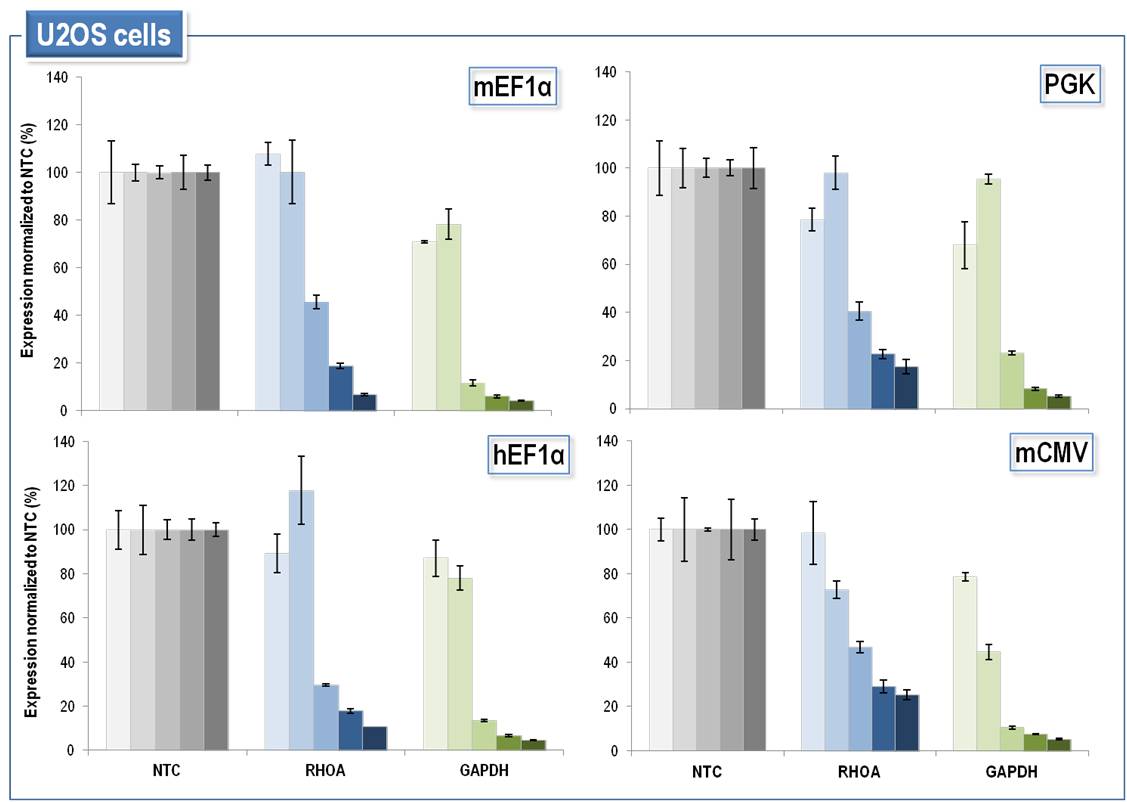
Induction of SMARTvector Inducible Lentiviral shRNA expression in a cancer cell line is robust and tightly controllable in a doxycycline dose-dependent manner. U2OS (human bone osteosarcoma epithelial) cells were transduced at MOI = 0.2 with the indicated SMARTvector Inducible Lentiviral shRNA vectors carrying a non-targeting control shRNA (NTC) or shRNAs directed against RHOA or GAPDH. Cells were selected with 1.5 µg/mL puromycin for 72 hours. shRNA expression was then induced with 0, 0.01, 0.1, 1.0 and 10 µg/mL doxycycline, respectively, and mRNA was harvested 72 hours after dox-induction. Target gene silencing was measured by RT-qPCR relative to the PPIB reference gene. Gene silencing is expressed relative to the vector- and doxycycline dosage-matched NTC cell population.
Induction of SMARTvector Inducible Lentiviral shRNA expression is temporally controlled and results in highly efficient gene silencing at very low MOI

Induction of SMARTvector Inducible Lentiviral shRNA expression is temporally controlled and results in highly efficient gene silencing at very low MOI. U2OS and HeLa cells were transduced at MOI = 0.15 with the indicated SMARTvector Inducible Lentiviral shRNA vector carrying a non- targeting control (NTC) shRNA or shRNAs directed against either GAPDH or RHOA. Cells were selected with 2 µg/mL puromycin for 3 days, expanded for up to 4 more days, and then stable populations were frozen and archived. Cells were later thawed, expanded and plated. shRNA expression was induced at 0, 24, 48, 72 and 96 hours prior to simultaneous harvesting. Target gene silencing was measured by RT-qPCR relative to the PPIB reference gene. Gene knockdown is expressed relative to the vector- and time-matched NTC cell population.
SMARTvector Inducible Lentiviral shRNAs permit tunable knockdown of specific target genes in mouse cells with all four promoter options
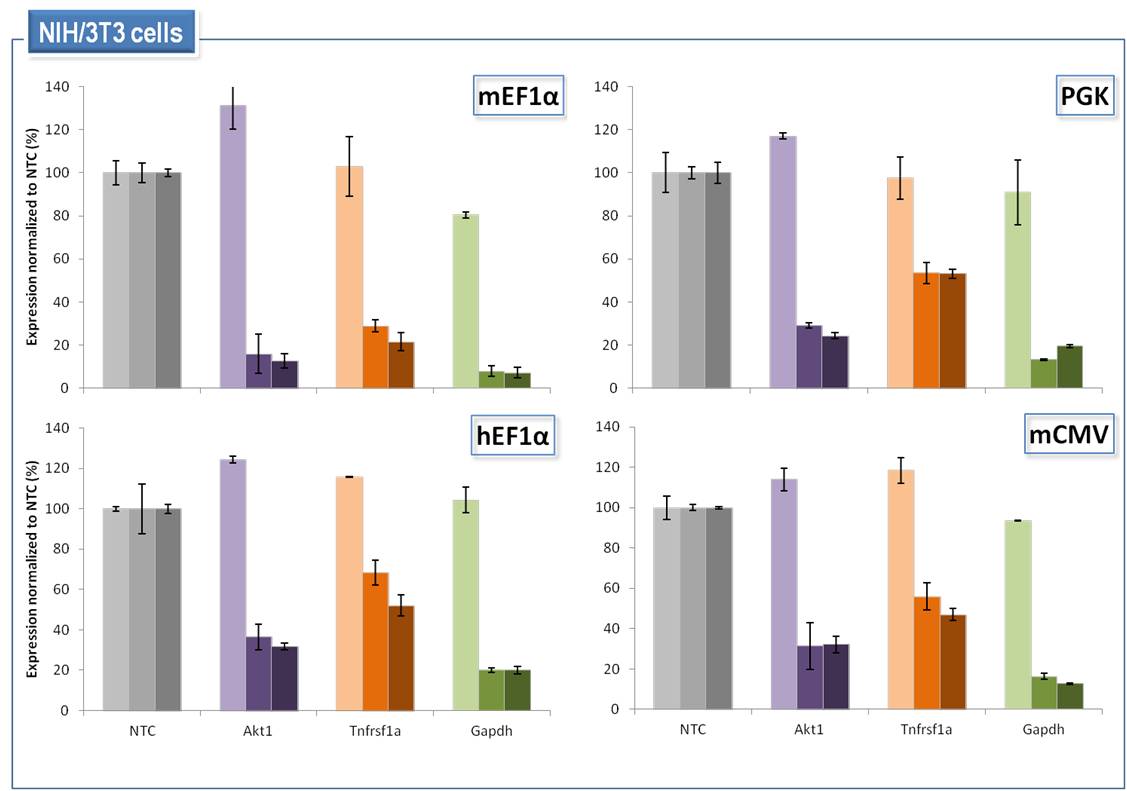
SMARTvector Inducible Lentiviral shRNAs permit tunable knockdown of specific target genes in mouse cells with all four promoter options. Mouse NIH/3T3 cells were transduced using 6 µg/mL Polybrene at MOI = 0.1 with the indicated SMARTvector Inducible Lentiviral shRNA vectors carrying a non-targeting control shRNA (NTC) or shRNAs directed against Akt1, Tnfrsf1α or Gapdh. Cells were selected with 3 µg/mL puromycin for 72 hours. shRNA expression was then induced with 0, 0.5 and 1.0 µg/mL doxycycline, respectively, and mRNA was harvest 72 hours after dox-induction. Target gene silencing was measured by RT-qPCR relative to the Ppib reference gene. Gene silencing is expressed relative to the vector- and doxycycline dosage-matched NTC cell population.
SMARTvector Inducible Lentiviral shRNAs permit tunable knockdown of specific target genes in human primary cells with all four promoter options.
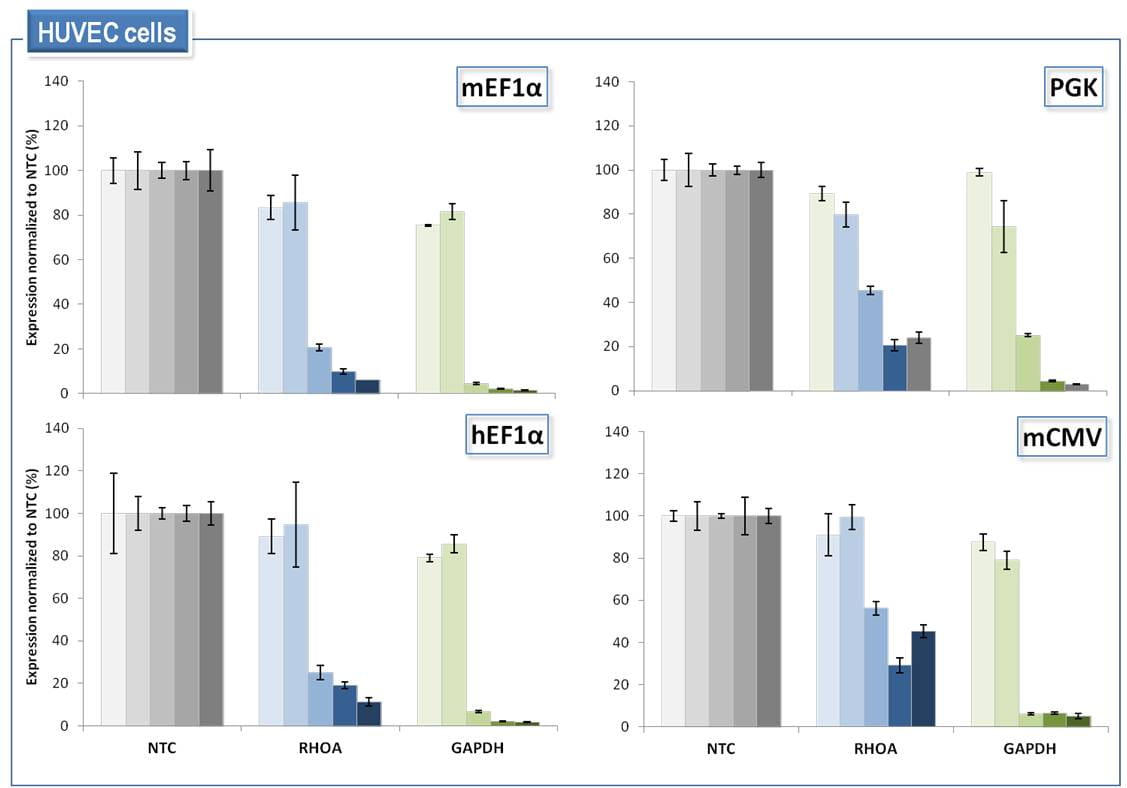
HUVEC (primary human umbilical vein endothelial) cells were transduced at MOI = 0.2 with the indicated SMARTvector Inducible Lentiviral shRNA vectors carrying a non-targeting control shRNA (NTC) or shRNAs directed against RHOA or GAPDH. Cells were selected with 1.5 µg/mL puromycin for 72 hours. shRNA expression was then induced with 0, 0.01, 0.1, 1.0 and 10 µg/mL doxycycline, respectively, and mRNA was harvested 72 hours after dox-induction. Target gene silencing was measured by RT-qPCR relative to the PPIB reference gene. Gene silencing is expressed relative to the vector- and doxycycline dosage-matched NTC cell population.
SMARTvector Inducible Lentiviral shRNAs enable tightly controlled knockdown of essential genes in a time- and doxycycline dose-dependent manner
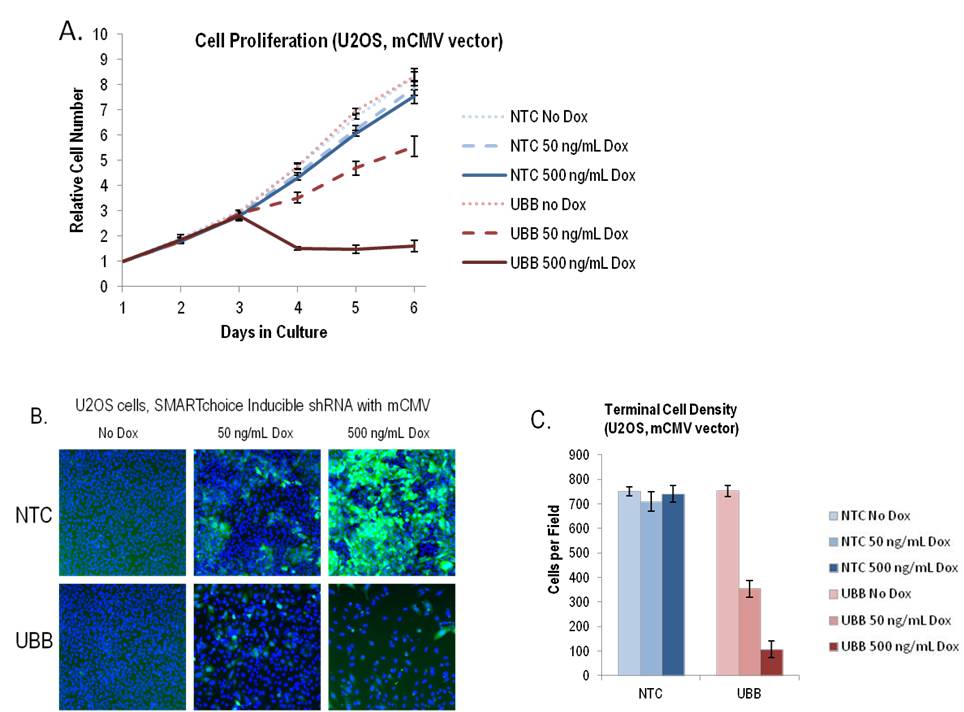
U2OS cells were transduced at MOI = 0.1 with SMARTvector Inducible Lentiviral mCMV vectors carrying either a non-targeting control shRNA (NTC) or an shRNA directed against the ubiquitin B (UBB) gene. Cells were selected for 3 days with 1.5 µg/mL puromycin. After selection, cells were seeded at 2000 cells per/well in 96-well plates. 24 hours later (Day 1), shRNA expression was induced with the indicated dose of doxycycline, and cell number was then measured each day with the Cell Titer-Glo® assay (Promega). Each data point represents the mean and standard deviation of six independent wells. B. On Day 6, following 5 days of exposure to doxycycline, the cells were stained with Hoescht 33342 and cell nuclei (blue) and TurboGFP (green) were imaged on the ArrayScan™ VTI HCS Reader. C. Cell density, defined as number of nuclei per field was computed for 18 fields per condition.
SMARTvector Inducible Lentiviral shRNA promoter activities differ across cell types
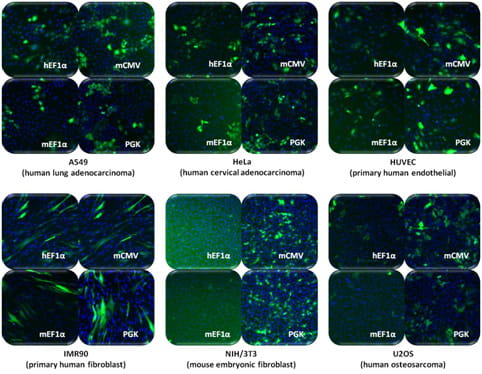
SMARTvector Inducible Lentiviral shRNA Non-targeting Controls were used to transduce the indicated cell types at MOI = 0.3. 24 h after transduction, expression of the non-targeting shRNA and PuroR was induced with 1 µg/mL doxycycline. After 48 h of culture in the presence of doxycycline, cells were stained with Hoescht-33342 and nuclei (blue) and TurboGFP (green) were imaged. While ~30% of the cells in the field have been transduced, some images may appear to contain fewer than 30% TurboGFP-positive cells due to low TurboGFP expression, indicative of low constitutive promoter activity, in a particular cell type.
Functionality of endogenous microRNAs are different
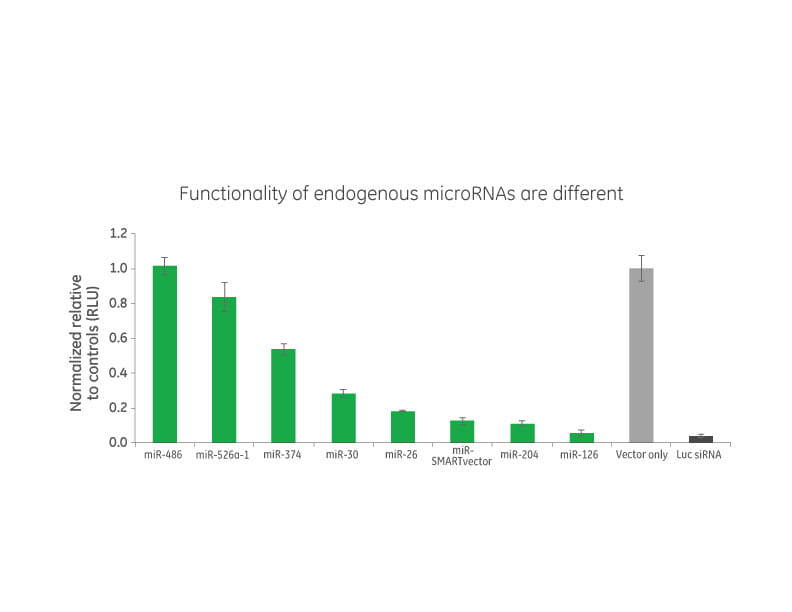
Incorporation of highly functional and appropriately processed microRNA scaffolds into lentiviral silencing constructs greatly enhances the functionality of DNA-based RNAi silencing. Different endogenous human microRNAs were tested in HeLa cells for the ability to silence their respective targets. Each microRNA exhibits a distinctive level of functionality. Several of the constructs (e.g., miR-486 and -526a) exhibited poor levels of activity, silencing their respective reporter constructs less than 20% while native miR-30 and -374 scaffolds provide moderate levels of gene silencing (~50-70%, see above). The scaffold selected as the basis for SMARTvector Inducible Lentiviral shRNAs efficiently processed and silenced its’ respective target by 80 to 90%. This highly functional microRNA represents a significant improvement over currently available microRNA-based scaffolds used in RNAi expression platforms.
Functionality of mature and passenger strands of endogenous microRNAs are different
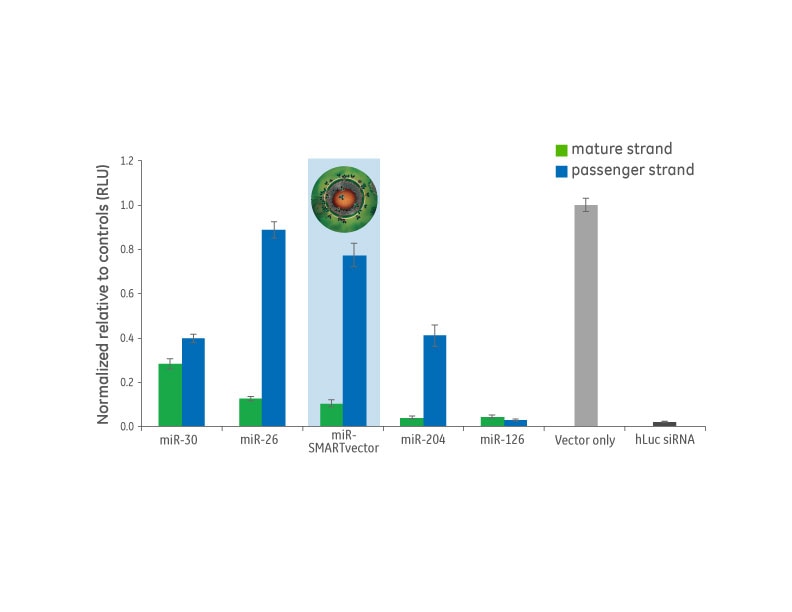
Preferred microRNA scaffolds have minimal passenger strand off-target effects. The Dharmacon team investigated the passenger strand activity of several of the scaffolds tested in the primary screen. The moderately functional miR-30 and the highly functional miR-126 exhibit undesirable passenger strand activity. In contrast, miR-SMARTvector shows potent mature strand activity with minimal passenger strand function.
microRNA-adapted shRNAs compared to simple hairpin shRNAs
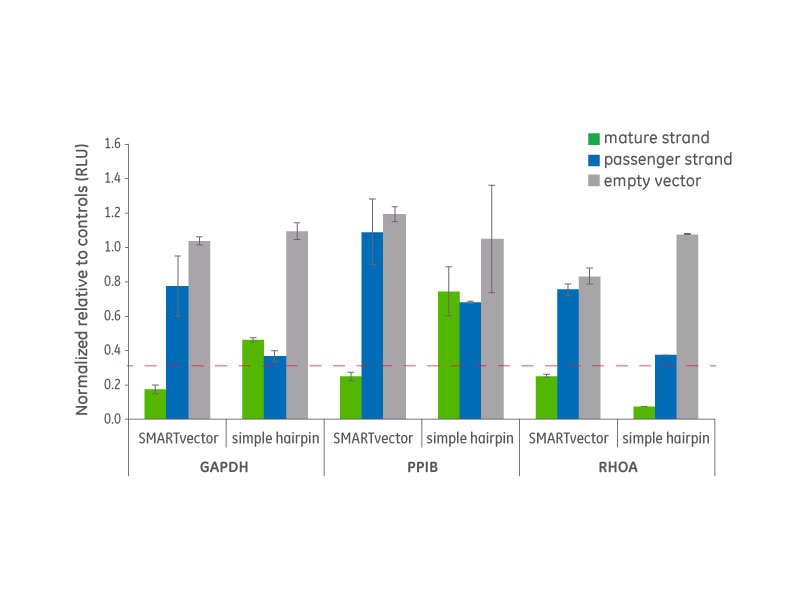
The SMARTvector microRNA-adapted shRNA platform shows considerably higher mature strand activity and lower passenger stand activity than simple hairpin shRNAs targeting the same gene. The result of the optimized microRNA-adapted scaffold is higher, more specific function while reducing the risk of off-target effects from the passenger strand.
Tet -inducible expression system references:
- Loew R, Heinz N, et al., Improved Tet -responsive promoters with minimized background expression. BMC Biotechnol . 10, 81 (2010).
- Zhou X, Vink M, et al., Optimization of the Tet -On system for regulated gene expression through viral evolution. Gene Ther . 13(19), 1382-1390 (2006).
LentiBOOST Lentivirus Transduction Enhancer is a uniquely formulated transduction reagent that can be used with or without lentivirus spinfection in order to increase successful viral transduction events while preserving cell viability. Especially critical for preserving precious primary cells from patient cohorts, or, for engineering complex animal models; improving transduction efficiency can save time and costs by increasing the success of each editing/transduction step, or, even avoid the loss of irreplaceable samples. Additionally, LentiBOOST technology is already used in the manufacturing of a number of clinical stage therapies providing the opportunity to demonstrate improved workflow applicability to the clinic.
LentiBOOST can be purchased through the Dharmacon Reagents catalog.
To learn more about LentiBOOST technology visit the Revvity LentiBOOST webpage.
Supporting Data
Improved CD8+ T-cell SMARTvector™ shRNA lentiviral system transduction using LentiBOOST™ Lentivirus Transduction Enhancer
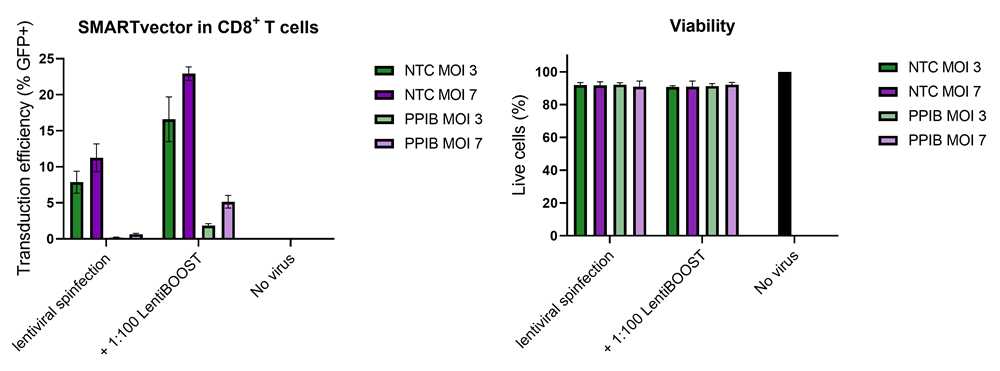
100,000 primary human CD8+ T cells were transduced with either 30,000 (MOI 3, green) or 70,000 (MOI 7, purple) TUs of SMARTVector™ mCMV tGFP Lentiviral Control Particles targeting either NTC or PPIB along with 1:100 LentiBOOST transduction enhancer. Cells were centrifuged at 800 x g for one hour at 32 °C followed by a four hour incubation prior to removal of lentiviral particles and transduction enhancer. Transduction efficiency (%GFP+ out of live cells) and viability were determined 5 days post-transduction by flow cytometry. The addition of LentiBOOST technology markedly improved transduction efficiencies without significantly impacting cell viability.
Improved CD4+ and CD8+ T-cell Edit-R™ All-in-one sgRNA/Cas9 lentiviral system transduction using LentiBOOST™ Lentivirus Transduction Enhancer
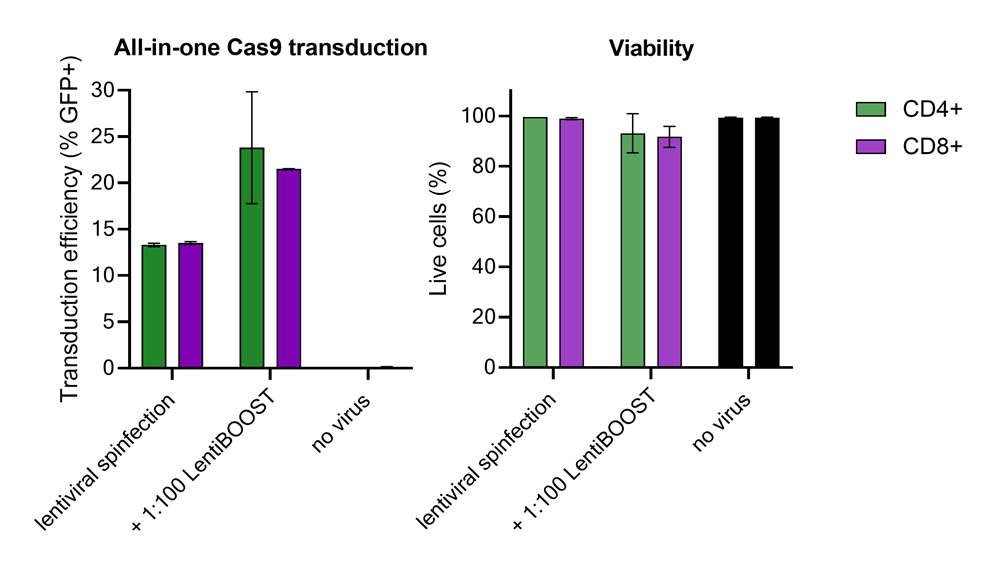
100,000 primary human CD4+ and CD8+ T cells from two donors were transduced with 250,000 TUs of Edit-R GFP Delivery controls mCMV along with 1:100 LentiBOOST transduction enhancer. Cells were centrifuged at 800 x g for one hour at 32 °C followed by an overnight incubation prior to removal of lentiviral particles and transduction enhancer. Transduction efficiency and viability were determined 72 hours post-transduction by flow cytometry. The addition of LentiBOOST technology markedly improved transduction efficiencies without significantly impacting cell viability.
Improved transduction of human induced pluripotent stem cells (hiPSCs) with the Strict-R™ Inducible CRISPRa lentiviral system transduction using LentiBOOST™ Lentivirus Transduction Enhancer

10,000 WTC hiPS cells were transduced with either 20,000 (MOI 2, green) or 40,000 (MOI 4, purple) TUs of Strict-R™ Inducible EGFP dCas9-VPR Lentiviral Particles along with 1:100 LentiBOOST transduction enhancer. Cells were centrifuged at 800 x g for one hour at 32 °C followed by an overnight incubation prior to removal of lentiviral particles and transduction enhancer. Transduction efficiency and viability were determined 72 hours post-transduction by flow cytometry. The addition of LentiBOOST markedly improved transduction efficiencies without significantly impacting cell viability.
Application notes
Protocols
Safety data sheets
Selection guides
Technical manuals
Related Products
The SMARTvector Inducible RNAi Controls are cost-effective tools for determining optimal conditions for delivery prior to using gene-specific SMARTvector Inducible Lentiviral shRNAs and shMIMIC Inducible Lentiviral microRNAs
LentiBOOST transduction enhancer can increase successful viral transduction in challenging to transduce cells, or, complex cellular engineering work; while preserving cell viability and minimizing the amount of viral particles required for your experiment. LentiBOOST technology is actively used in the production of clinical stage lentivirally delivered therapies, including some approved therapies, providing a direct path to therapeutic applicability for your research studies. Tested with Dharmacon Lentiviral reagents.
shMIMIC Inducible Lentiviral microRNAs combine all the advantages of the unique shMIMIC microRNA expression design with the Tet-On 3G tetracycline-inducible expression system and the flexibility of SMARTchoice promoter and reporter options.
Guaranteed gene silencing with state-of-the-art shRNA designs and multiple promoter and reporter options.

